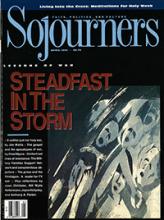The waning media coverage of public dissent since the outbreak of the Gulf war in January (due partly to the public backlash against such dissent) makes it hard to get an accurate picture of the breadth of opposition around the country. But it seems that aside from a few impressive national demonstrations in major cities, the opposition to the Gulf war is organized mostly at the regional and local levels -- where there have been countless nonviolent demonstrations, candlelight vigils, teach-ins, processions, ecumenical prayer services, and civil disobedience actions.
Some observers believe that the lack of a visible national movement has its benefits. "It's forcing people to be imaginative at the local level," says Gene Stoltzfus, of Christian Peacemaker Teams (CPT) in Chicago. CPT is calling on members of Church of the Brethren and Mennonite churches and others to come to Washington, DC, sometime between March 17 and April 17 for vigiling and lobbying against the war.
The Fellowship of Reconciliation has called on all local chapters and other grassroots peace and justice groups to participate in protests the 15th and 16th of every month -- the anniversary of the start of the war -- until the war ends. The focus March 15 will be on media and censorship of war-related news, and April 15 (Tax Day) will focus on the domestic costs of the war.
Read the Full Article
